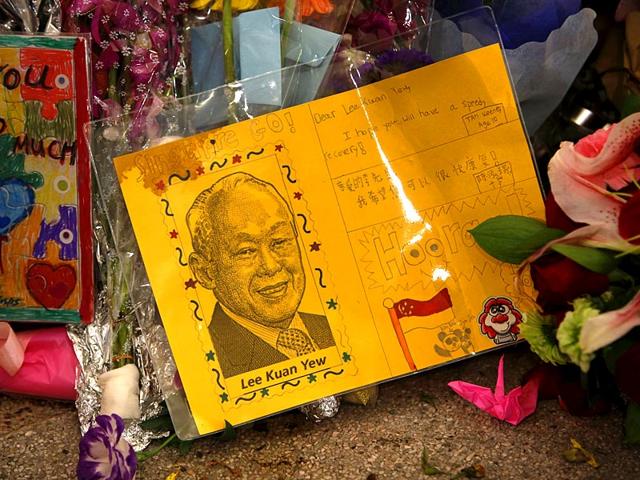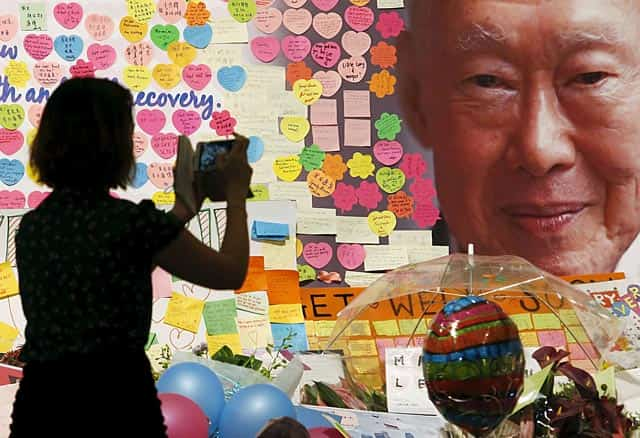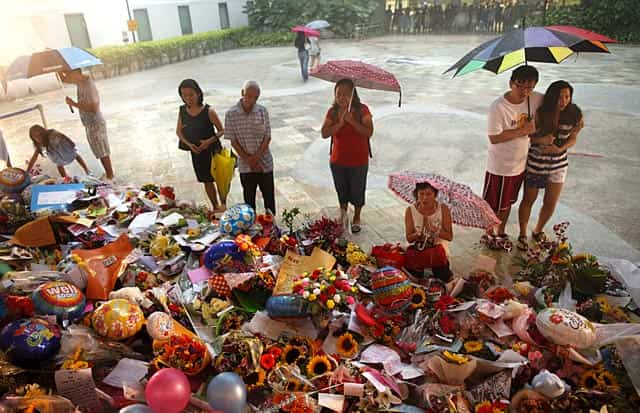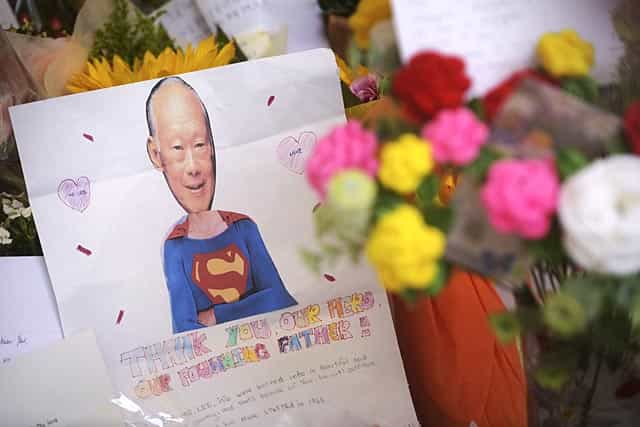Singaporeans mourn death of founding father Lee Kuan Yew
Singaporeans wept and world leaders paid tribute Monday as the Southeast Asian city-state mourned the death of its founding father Lee Kuan Yew.
Singaporeans wept and world leaders paid tribute Monday as the Southeast Asian city-state mourned the death of its founding father Lee Kuan Yew.

The government announced that Lee, 91, "passed away peacefully" early Monday at Singapore General Hospital. An increasingly frail Lee was hospitalized in February with severe pneumonia.

A woman takes photos of cards for former Singaporean prime minister Lee Kuan Yew, placed at a well-wishing corner at the Singapore General Hospital in Singapore, few days before he passed away. (Reuters Photo)
State television broke away from regular programming with a hagiographic tribute to Lee's life. In a live broadcast, one of its reporters called Lee's death the "awful and dreaded" news.
Lee commands immense respect among Singaporeans, who this year will celebrate the country's 50th anniversary of independence. He led multiracial Singapore for more than three decades until 1990, and is credited with transforming the resource poor island into a wealthy bustling financial hub with low crime and almost zero corruption.
His son, the current prime minister Lee Hsien Loong, struggled to hold back tears in a televised address to the nation.
Speaking in Malay, Mandarin and English, the prime minister said Lee built a nation and gave Singaporeans a proud national identity.

In this July 29, 1964, photo, Singapore's then- Prime Minister Lee Kuan Yew addresses a crowd from a vehicle in Singapore. (AP File Photo)
"We won't see another man like him. To many Singaporeans, and indeed others too, Lee Kuan Yew was Singapore," he said.
At the hospital where Lee spent the last weeks of his life, 55-year-old Maligah Thangaveloo cried as she clasped her hands in prayer before an expansive array of flowers and cards left by Singaporeans. Calling Lee "father," she recalled shaking hands with him as a nine-year-old when he visited her school.
President Barack Obama called Lee a "visionary" in a statement, saying he was "deeply saddened" to learn of his death. Obama, who met Lee during a visit to Singapore in 2009, said his "remarkable" leadership helped build "one of the most prosperous countries in the world today."
He said Singapore's success meant that Lee's counsel was sought by political leaders around the world. Lee was also "hugely important in helping me reformulate our policy of rebalancing to the Asia Pacific," Obama said.
The Singapore government has declared seven days of national mourning and flags will fly at half-staff on state buildings. A private wake for the Lee family will take place on Monday and Tuesday. After that, Lee will lie in state at parliament until a state funeral Sunday.
Sayeed Hussain, an IT executive, said Lee was a "great hero" to Singaporeans as he paid respects at Singapore General Hospital.
"It is our duty to respect him and recognize him as a great hero in the world," said Hussain. "This is our last chance to do so."
Under Lee and his successors, Singapore was known around the world for its strict social order including a ban on chewing gum, restrictions on free speech and canings for crimes some countries would rule as minor. In recent years, it has become socially more liberal and the fragmented political opposition made gains in Singapore's last elections in 2011.
After stepping down as prime minister, Lee remained part of the Cabinet and an influential figure in Singapore and the region.
Australian prime minister Tony Abbott said Lee was a "giant of our region."
Lee Kuan Yew: Visionary and icon of Asian politics
Lee Kuan Yew, the first prime minister of Singapore, and one of the most influential political figures in Asia died here on Monday after a prolonged battle with pneumonia.

People pay tribute outside Singapore General Hospital, where Lee Kuan Yew passed away. (AFP Photo)
Born on September 16, 1923, he was widely considered as the father of the modern day Singapore and the leader who made the island nation the most prosperous in Southeast Asia.
Lee was born into a wealthy Chinese family that had lived in Singapore since the 19th century. He did his schooling in Singapore before studying law in the University of Cambridge in Britain. In 1950, Lee was admitted to the English bar, but chose to return to Singapore, instead of pursuing a career in Britain.
While in Britain, Lee embraced the ideology of socialism. In the early 1950s, he allied with individuals like David Saul Marshall and Lim Yew Hock and raised the pitch for a constitutional reform in the country.
Singapore, at that time, was a British colony and housed Britain's principal naval base in East Asia. The country was ruled by a governor and a legislative council mostly comprising wealthy Chinese businessmen, who were appointed rather than being elected.
Lee took it upon himself to challenge the hold of the businessmen in the legislative council. However, he soon adopted a more radical stance and parted ways from his allies. In 1954, he floated the People's Action Party (PAP).
In the subsequent legislative council elections, the PAP won three seats.
In 1956, Lee returned to London as a member of a Singaporean delegation that unsuccessfully sought self-rule for the colony.
Unrest in Singapore followed, during which a number of PAP leaders were imprisoned.
In the following year, negotiations in London resumed, again with Lee on the delegation. After an agreement was reached on a measure of self-government, Lee won a by-election in Singapore by an overwhelming majority.
The next year in London, Lee helped negotiate the status of a self-governing state within the Commonwealth for Singapore.

Lee commands immense respect among Singaporeans, who this year will celebrate the country's 50th anniversary of independence. In this photo, another well-wishing card. (AP Photo)
Elections were held under Singapore's new constitution in May 1959, and Lee called for social reforms and eventual union with the erstwhile Federation of Malaya.
Lee's party won a decisive victory, gaining 43 of the 51 seats, but Lee refused to form a government until the British freed the left-wing members of his party who had been imprisoned in 1956. After their release, Lee was sworn in as prime minister on June 5, 1959, and he formed a cabinet.
He introduced a five-year plan calling for slum clearance and the building of new public housing, the emancipation of women, the expansion of educational services, and industrialisation.
In 1962, Lee led Singapore into a merger with Malaysia, but three years later, Singapore left the union. Lee resigned as prime minister in 1990.
Lee recognised that Singapore needed a strong economy in order to survive as an independent country, and launched a programme to industrialise Singapore and transform it into a major exporter of finished goods. He encouraged foreign investment and secured agreements between labour unions and business management, thereby ensuring labour peace and a rising standard of living for workers.
Lee's successor as prime minister, Goh Chok Tong, named Lee to the cabinet position of senior minister, from which he continued to exercise considerable influence. Upon Goh's resignation as prime minister in 2004, he was succeeded by Lee's son Lee Hsien Loong.
Lee Kuan Yew remained in the cabinet as "minister mentor", a position he held until 2011, when he finally stepped down from the cabinet. He continued to hold his seat in Parliament, however, being re-elected in 1991, 1997, 2001, 2006, and 2011.
Lee's death signals an end of an era and leaves a huge void in Singaporean politics.



